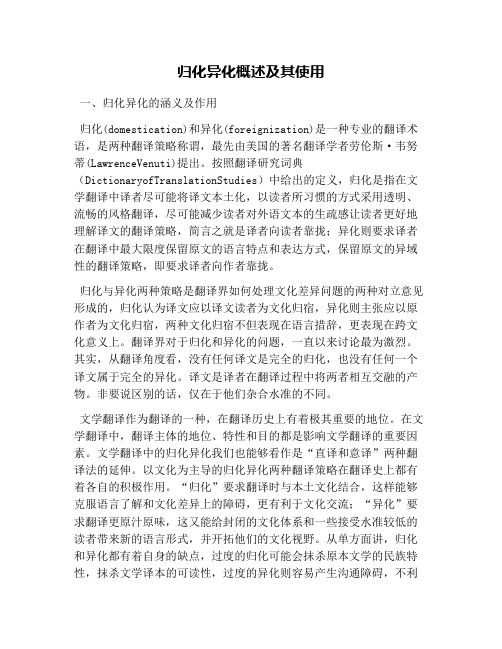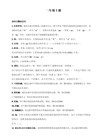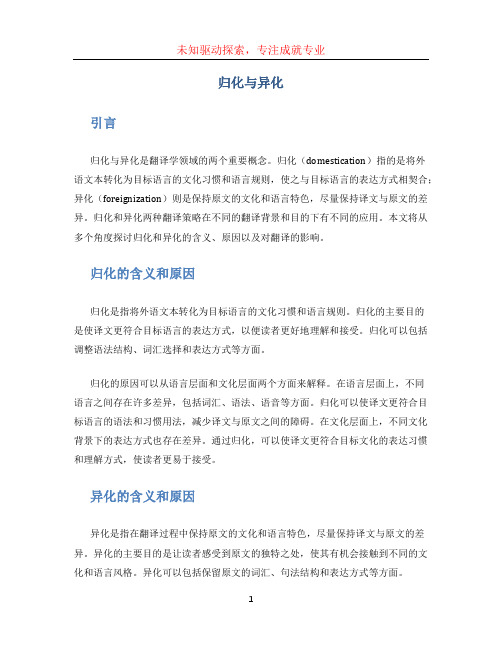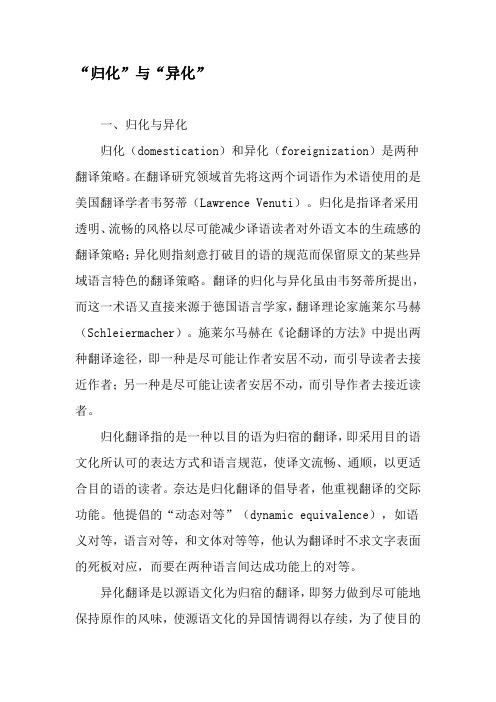归化与异化
中英互译中的异化法与归化法

中英互译中的异化法与归化法一、异化与归化的含义异化:指在翻译方法上迁就外来文化的特点吸纳外语表达方式。
Foreignization: refers to the characteristics of foreign cultures before the translation method, and absorbs foreign language expressions .归化:指恪守本族文化的语言传统,回归地道的本族语表达方式。
Domestication: the language tradition that abides by the native culture and the idiomatic expression of native language .二、翻译实例:1、A good teacher should have his head in the clouds sometimes , but his feet always on the ground .异化法翻译:一个好老师的头有时要放在云层中,但他的脚应该永远站在地上。
归化法翻译:一个好老师应该有时富于幻想,但时刻必须从实际出发。
2、Go to law for sheep , you lose a cow .异化法翻译:为了一只羊打官司,却损失了一头牛。
归化法翻译:捡了芝麻,丢了西瓜。
异化法: trump card王牌sour grapes酸葡萄grade inflation分数贬值归化法:talk horse吹牛at a stone’s throw近在咫尺,一箭之遥wet like a drown湿如落汤鸡as stupid as a goose蠢得像猪A big reward will make the brave come forward. 重赏之下,必有勇夫。
Only a headhunter like Bo Le---an ancient Chinese good at headhunting fine steeds---can discover talented people. 有伯乐而后得千里马。
异化与归化

翻译---异化(foreignization)与归化(domestication)(一)异化法是接受原文与译文的语言、文化等差异,忠实传达原文内容,把读者带人异国情景。
该方法要求译者向原文作者靠拢,力争采取相应于原语的表达方式,即鲁迅先生提及过的“异国情调”和“洋气”。
异化是指以源语文化为导向的翻译,异化着眼于对民族文化差异性的保留,译文尽可能多地反映异域文化特性和语言风格,使译语文化的读者有出境感,其实质是注重形式对等。
1. 异化翻译的例子1、铁饭碗iron rice bowl2、纸老虎paper tiger3、天有不测风云,人有旦夕祸福A、Truly storms gather without warning in nature,and bad luck befalls men overnight.(翻译家杨宪益、戴乃迭夫妇采用异化方法)B、I know the weather and human life are both unpredictable.(霍克斯则采用归化方法)炮火的考验--(baptism of fire)炮火的洗礼政治本钱--(political capital)政治资本换汤不换药--(new wine in old bottles)旧瓶装新酒杀手锏--(trump car)王牌(二)归化法与异化法相反,归化译法要求译者向译语读者靠拢,采取读者关照的态度,使原文符合译语的文化价值观,把原文作者带人译语文化之中。
归化的译法旨在使译文通顺易懂,能为译语读者所接受。
归化:指恪守本族文化的语言传统,回归地道的本族语表达方式。
1. 归化翻译的例子1、Things Go Better With Coke.可口可乐,顺心顺意!2、He,of course,was proud of his success.But to his disappointment,few people would buy his book.面对着自已的成功,那股自豪之情自不待言。
浅谈关于归化和异化的认识的论文

浅谈关于归化和异化的认识的论文归化和异化是翻译理论的热门话题,归化和异化之争大大推动了“归化”和“异化”的研究。
该文是对归化和异化的一些理解和认识。
归化;异化;翻译;文化意象1.引言在我国翻译史上,异化和归化之争见于现代史上以“信”和“顺”为代表的直译和意译之间的大规模论战。
近年来,国内的外语类学刊发表了不少有关归化和异化的文章,这些文章努力将西方文学批评和比较文学理论中关于归化和异化的讨论运用于翻译理论和实践之中,有的文章高屋建瓴,从文化的角度对直译和意译作出概括,还有的文章运用关联理论来寻求归化和异化的最佳关联点,这些文章从不同的角度拓宽了归化和异化的研究。
归化和异化之争已经成为翻译理论的热门话题。
对于这样一个带有双重性问题的争论,往往难有最终的结论。
争论的双方如果不从根本上调整自己的论证方法,提供充分可信的证据来支持自己的观点,新一轮的辩论也许将和历史上的直译和意译之争一样,最后只能是仁者见仁,智者见智。
但我们必须清楚翻译过程不仅是把一种语言转换成另一种语言的活动,而且是一种文化交流活动。
随着国际全球化,国与国之间的贸易往来,文化交流活动日益频繁。
在国与国之间的交流中,翻译活动起着越来越重要的作用。
本文将从跨文化的角度,对翻译中的归化和异化现象加以剖析,以说明归化和异化在翻译中的作用。
2.语言与文化意象语言(language)不仅是人类思想感情表达与交流的工具,而且是文化的组成部分,是文化的载体。
语言能真切地反映一个国家、一个民族的生态地域、政治经济、物质文化、宗教信仰、风俗习惯等。
不同的语言决定了不同民族的不同思维方式,行为方式以及语言表达方式。
文化意象(cultureimage)是“一种文化符号,它具有了相对固定的独特的文化含义,有的还带有丰富的意义,深远的联想,人们只要一提到它们,彼此间立刻心领神会,很容易达到思想沟通。
汉语、英语分属两大不同的语系。
汉语是象形文字,而英语是一种字母文字。
异化和归化的概念

异化和归化的概念异化和归化,这两个看似高深莫测的概念,其实就存在于我们生活的方方面面啊!异化呢,就像是一个人在陌生的环境中逐渐迷失了自己,变得和原本的自己不一样了。
比如说,我们在工作中,可能会因为各种压力和规则,慢慢失去了自己的个性和热情,这不就是一种异化吗?这就好像原本自由自在的小鸟被关进了笼子里,失去了翱翔天空的能力呀!而归化呢,则像是一个外来者逐渐融入了新的环境,适应了新的规则。
就好比一个外国人来到我们国家,慢慢地学会了我们的语言、文化和习俗,变得和我们一样了。
这不就是一种归化嘛!想想看,我们在学习新的知识和技能时,不也是在经历着归化的过程吗?我们不断地调整自己,去适应新的要求和挑战。
异化和归化并不是完全对立的呀,它们有时候会同时发生呢!就像我们在成长的过程中,一方面可能会被社会的各种因素所异化,变得世故和圆滑;但另一方面,我们也在不断地归化,去适应这个社会的变化和发展。
这多像一场拔河比赛啊,异化和归化在两边拉扯着我们。
再想想我们的社会,科技的飞速发展不就是一种异化的力量吗?它让我们的生活变得越来越便捷,但也让我们变得越来越依赖它。
我们整天拿着手机,是不是感觉离开了手机就好像失去了什么似的?这难道不是一种异化吗?但同时,我们也在归化,我们学会了利用科技来提高自己的生活质量,让生活更加美好。
教育也是如此啊!传统的教育模式可能会让学生们异化,只知道死记硬背,失去了创造力和想象力。
但现在的教育也在不断改革和进步,注重培养学生的综合素质,这就是一种归化的表现嘛!那到底异化和归化哪个更重要呢?这可真的很难说呀!异化可能会让我们失去一些东西,但也可能会让我们变得更加坚强和成熟;归化可能会让我们更加适应社会,但也可能会让我们失去自我。
它们就像是一枚硬币的两面,缺一不可。
我们不能只看到异化的坏处,也不能只看到归化的好处。
我们要学会在异化和归化之间找到平衡,让自己既能保持独特的个性,又能适应社会的发展。
这样,我们才能在这个纷繁复杂的世界中活出自己的精彩,不是吗?。
翻译中的归化与异化

“异化”与“归化”之间的关系并评述1、什么是归化与异化归化”与“异化”是翻译中常面临的两种选择。
钱锺书相应地称这两种情形叫“汉化”与“欧化”。
A.归化所谓“归化”(domestication 或target-language-orientedness),是指在翻译过程中尽可能用本民族的方式去表现外来的作品;归化翻译法旨在尽量减少译文中的异国情调,为目的语读者提供一种自然流畅的译文。
Venuti 认为,归化法源于这一著名翻译论说,“尽量不干扰读者,请作者向读者靠近”归化翻译法通常包含以下几个步骤:(1)谨慎地选择适合于归化翻译的文本;(2)有意识地采取一种自然流畅的目的语文体;(3)把译文调整成目的语篇体裁;(4)插入解释性资料;(5)删去原文中的实观材料;(6)调协译文和原文中的观念与特征。
B.“异化”(foreignization或source-language-orientedness)则相反,认为既然是翻译,就得译出外国的味儿。
异化是根据既定的语法规则按字面意思将和源语文化紧密相连的短语或句子译成目标语。
例如,将“九牛二虎之力”译为“the strength of nine bulls and two tigers”。
异化能够很好地保留和传递原文的文化内涵,使译文具有异国情调,有利于各国文化的交流。
但对于不熟悉源语及其文化的读者来说,存在一定的理解困难。
随着各国文化交流愈来愈紧密,原先对于目标语读者很陌生的词句也会变得越来越普遍,即异化的程度会逐步降低。
Rome was not built in a day.归化:冰冻三尺,非一日之寒.异化:罗马不是一天建成的.冰冻三尺,非一日之寒异化:Rome was not built in a day.归化:the thick ice is not formed in a day.2、归化异化与直译意译归化和异化,一个要求“接近读者”,一个要求“接近作者”,具有较强的界定性;相比之下,直译和意译则比较偏重“形式”上的自由与不自由。
归化与异化

Domestication & Foreignization归化与异化一、异化归化的概念及特点Questions:长期以来,翻译中一直存在着源语(source language)与目的语(target language),原文作者与目的语读者之间的矛盾。
如何解决这些矛盾呢?怎样尊重及保存民族文化?怎样将有中国特色的文化传统译介给国外的读者?如何在翻译中保持源语的文化特征?1.归化与异化的正式提出:1995年,美国翻译理论家劳伦斯韦努蒂(Lawrence Venuti)的《译者的隐身:一部翻译史》(The Translator’s Invisibility: A History of Translation)问世,里面使用了一对关键术语—domesticating translation & foreignizing translation, 中文译作“归化”和“异化”。
归化(Domestication):“the translation strategy in which a transparent, fluent style is adopted in order to minimize the strangeness of the foreign text for TL (target language) readers”.是指在翻译中采用透明、流畅的风格,最大限度地淡化原文的陌生感的翻译策略。
归化尽可能的使源语文本所反映的世界接近目的语文化读者的世界,从而达到源语文化与目的语文化之间的“文化对等”。
归化法的特点:target language culture oriented以目的语文化为归宿归化法的优点:1) smoothness in language;2) easily accepted by TL readers.1) New brooms sweep clean. (proverb)译文1:新扫帚扫得干净。
翻译——异化与归化

,甚至会出现某些意思丧失的 情况 。但在直译 、意译中 ,不论选用哪一种,原文的内容都会得到忠实的表达 。如林 纤翻译的作品 ,我们只能说是归化翻译,不能称之为意译 ,因为他对原文进行了很多改 写与创造。这是两对术语的区别之一。 2)直译与意译是翻译方法,而归化与异化是翻译策略,二者不在一个层 次 上 ,后者指 导前者。《现 代汉语词典》(修订本)说“方法”是“关于解决思想、说话、行动等问 题的门路 、程序等。”而“策略”是“根据形势发展而制定的行动方针和斗争方式 。” 方法和策略是有一定联系的,方法是策略指导下的具体做法,策略是指导方法的方针与 目标 。在归化和异化的指导下,译者选择与之相适应的译法,除直译 、意译外 ,还有夹 叙夹译 、音译 、编 译等多种方法。 因此,归化与异化跟直译与意译虽然有一定的联系,但也存在着明显的区别。把两 对术语混合使用 ,不利于范畴的规范化 ,不利于理论研究 ,也不利用于翻译实践 。
异 化 与 归 化
一 归化与异化的来源及其内涵
汉语中的归化与异化在英文中有两对术语与之对应:第一对是“assimilation and alienation”,第二对是“domestication and foreignization”。
1. assimilation and alienation
2. domestication and foreignization
这对术语由美国著名翻译家韦努蒂(L. Venuti)于1995年在《译者的隐身》 (The Translator’s Invisibility)中提出,是用以表述两种不同的翻译策略 (strategy)的。韦努蒂认为 domestication含有贬义,因为 “ it is identified with a policy common in dominant cultures which are ‘aggressively monolingual, unreceptive to the foreign ’, and which he describes as being ‘accustomed to fluent translations that invisibly inscribe foreign text with (target language) values and provides readers with narcissistic experience of recognizing their own culture in a cultural other’.”韦努蒂对domestication的界定与前面论及过的 assimilation并无本质上的区别,但我们不得不注意domestication有更深层的含 义。韦努蒂认为选择这一翻译策略的原因不仅是为了方便读者阅读,更重要的 是因为两种文化不平等,为此他提出了“强势文化”(dominant culture)的概念, 他认为强势文化的排外性与强制性是选用这一策略的最主要的原因。当弱势文 化的语言翻译成强势文化的语言(主要是英语)时,为了得到强势文化读者的接 受与认同,就必须选用他们所乐于接受的内容与形式。因此,domestication 的 这层含义用到翻译策略上,则是强势文化为达到对弱势文化殖民统治的目的与 需要,重组原文的语言与文化特点,使之符合强势语言与文化的规范。这层意思 assimilation没有。 关于foreignization,韦努蒂把它看作是对domestication翻译策略的挑战, 其作用是“register the linguistic and cultural difference of the foreign text, sending the reader abroad.”这样在翻译中保留原文语言和文化的特色,让译文
归化异化ppt课件

21
22
霍克斯:为了取悦于译文读者,是为一 般的英美读者翻译的,因此他遵循了以 目的语文化为归宿的原则,即采用了 “归化”的方法。 杨宪益:想尽可能多地把中国文化介绍 给英美读者,是以想多了解中国文化的 英美读者为对象的,因而基本上遵循了 以源语文化为归宿的原则,即采用了 “异化”的方法。
20
翻译中“归化”和“异化”不仅是不 矛盾的,而且是互为补充的。不管怎样 发展,“归化”和“异化”将永远同时 并存,缺一就不成其为翻译。
6
• 直译和意译所关注的核心问题是如 何在语言层面处理形式和意义;
• 异化和归化则突破语言因素的局限, 将视野扩展到语言、文化和美学等因素。
• 直译 = 异化 • 意译 ≠ 归化
7
• Kill two birds with one stone.
归化 一箭双雕
意译 一举两得
异化
一石二鸟
8
谋事在人,成事在天。
16
霁月难逢,彩云易散。心比天高,身为下贱。风流
灵巧招人怨。寿夭多因诽谤生,多情公子空牵念。
杨译: A clear moon is rarely met with, Bright clouds are easilyscattered; Her heart is loftier than the sky, But her person is of low degree. Her charm and wit give rise to jealousy, Her early death is caused by calumny. In vain her loving master’s grief must be.
文化翻译中的归化和异化

文化翻译中的归化和异化一、本文概述本文旨在探讨文化翻译中的归化和异化两种策略,分析其在跨文化交流中的重要性及其运用。
我们将对归化和异化的概念进行界定,明确两者在文化翻译中的具体表现。
接着,通过具体案例分析,揭示归化和异化策略在实际文化翻译中的应用及其效果。
在此基础上,我们将进一步探讨归化和异化策略在文化翻译中的优缺点,以及如何选择和应用这两种策略。
我们将总结文化翻译中归化和异化的价值,强调在跨文化交流中,应根据具体语境和翻译目的灵活运用归化和异化策略,以实现有效的文化传播和交流。
通过本文的研究,我们期望为文化翻译实践提供有益的启示和指导,推动跨文化交流的深入发展。
二、归化翻译策略归化翻译策略,作为一种重要的文化翻译手段,主张在翻译过程中以目标语言的文化为归宿,尽量使译文符合目标语言的表达习惯和文化传统,以便读者能够更好地理解和接受。
归化翻译强调译文的自然流畅,减少源语言文化的陌生感,从而增强译文的可读性。
在归化翻译策略的指导下,译者会倾向于使用目标语言中的常见表达方式和文化元素,以便读者能够更好地融入译文所传达的情境。
这种策略注重译文与目标语言文化的融合,旨在减少文化差异带来的理解障碍。
归化翻译策略的优点在于,它能够使译文更加贴近目标语言读者的阅读习惯和审美需求,增强译文的可接受性。
同时,归化翻译还有助于传播目标语言文化,促进不同文化之间的交流和理解。
然而,过度使用归化翻译策略可能导致源语言文化的某些独特元素丢失,使译文失去原有的文化色彩。
在实施归化翻译策略时,译者需要谨慎处理源语言文化元素与目标语言文化元素之间的关系,确保在保留源语言文化特色的使译文符合目标语言读者的阅读习惯。
这要求译者具备较高的跨文化意识和语言处理能力,以便在翻译过程中实现源语言文化元素与目标语言文化的有效融合。
归化翻译策略作为一种重要的文化翻译手段,有助于增强译文的可读性和可接受性,促进不同文化之间的交流和理解。
然而,译者在运用这一策略时需要充分考虑源语言文化元素的保留和目标语言读者的阅读习惯,以实现源语言文化元素与目标语言文化的有效融合。
归化异化概述及其运用

归化异化概述及其使用一、归化异化的涵义及作用归化(domestication)和异化(foreignization)是一种专业的翻译术语,是两种翻译策略称谓,最先由美国的著名翻译学者劳伦斯·韦努蒂(LawrenceVenuti)提出。
按照翻译研究词典(DictionaryofTranslationStudies)中给出的定义,归化是指在文学翻译中译者尽可能将译文本土化,以读者所习惯的方式采用透明、流畅的风格翻译,尽可能减少读者对外语文本的生疏感让读者更好地理解译文的翻译策略,简言之就是译者向读者靠拢;异化则要求译者在翻译中最大限度保留原文的语言特点和表达方式,保留原文的异域性的翻译策略,即要求译者向作者靠拢。
归化与异化两种策略是翻译界如何处理文化差异问题的两种对立意见形成的,归化认为译文应以译文读者为文化归宿,异化则主张应以原作者为文化归宿,两种文化归宿不但表现在语言措辞,更表现在跨文化意义上。
翻译界对于归化和异化的问题,一直以来讨论最为激烈。
其实,从翻译角度看,没有任何译文是完全的归化,也没有任何一个译文属于完全的异化。
译文是译者在翻译过程中将两者相互交融的产物。
非要说区别的话,仅在于他们杂合水准的不同。
文学翻译作为翻译的一种,在翻译历史上有着极其重要的地位。
在文学翻译中,翻译主体的地位、特性和目的都是影响文学翻译的重要因素。
文学翻译中的归化异化我们也能够看作是“直译和意译”两种翻译法的延伸。
以文化为主导的归化异化两种翻译策略在翻译史上都有着各自的积极作用。
“归化”要求翻译时与本土文化结合,这样能够克服语言了解和文化差异上的障碍,更有利于文化交流;“异化”要求翻译更原汁原味,这又能给封闭的文化体系和一些接受水准较低的读者带来新的语言形式,并开拓他们的文化视野。
从单方面讲,归化和异化都有着自身的缺点,过度的归化可能会抹杀原本文学的民族特性,抹杀文学译本的可读性,过度的异化则容易产生沟通障碍,不利于读者理解了解以及对整个篇章的把握。
归化与异化

2.归化策略
从语言文化共核来看,人类语言有90%是相通的,这就为归化翻译奠定了基础。归化作为一种思想倾向,表现在对原文的自由处理上,要求译文通顺,以符合目的语读者兴趣。“归化”的一般做法是抓住原文语用意义,从目的语中选取与原文语用意义相同的表达来翻译。也就是说“归化”法是将原文独具特征的东西采取“入乡随俗”的方法融化到目的语中的转换方法。归化是语言形式上或者语言形式所负载的文化内涵倾向于目的语的翻译策略。总的说来,就是反对引入新的表达法,使语言本土化。例如:(1)“煞风景”若译成“Kill the scenery”将无人理解。最好还是按照英语的表达习惯译成“be a wet blank”更能为人接受。(2)“拍马屁”译为“lick sb’s boots”比“pack the horse’s buttock”更妥当。从以上两例可以看出归化更为读者考虑,从目的语出发。其长处就是能使译文读上去或听上去更通顺地道,能给读者带来一种亲切感。
2.2替代法
将原语中带有文化色彩的词语(物象)转换成译语中带有同等文化色彩的词语(物象)。这种用法多用于习语和比喻性词语的翻译。如:亚洲四小龙译为:four Asian tigers, as strong as a horse 译为:力大如牛。前例的译法除了考虑到英、汉语两种文化中“dragon”(龙)的不同的文化象征外,还考虑了两种文化中的“tiger”和“龙”的相同的文化象征后例则说明了两种文化中“horse”与“牛”在文化意义上是对等的。因为英国古代以马耕为主,英国人对马有深厚的情感,因此,在英美文化中马是勤劳和吃苦耐劳的象征。与此相反,在汉语民族的文化心理上,牛是吃苦耐劳的象征,是很通人性的动物。中国自古以来主要靠牛耕,且牛秉性勤劳忠厚,自然形成了中国人对牛的热爱和赞誉。
归化与异化

归化与异化归化与异化是翻译学中常用的两个概念,用于描述在翻译过程中译者使用源语言和目标语言不同的策略。
归化指的是在翻译中倾向于使用目标语言文化和语言习惯,使译文更符合目标语言读者的理解和习惯。
异化则是指在翻译中保留源语言文化和语言特色的同时,将译文逐字逐句地照搬到目标语言中。
归化与异化这两种策略在具体翻译实践中既可以单独使用,也可以结合使用,取决于具体的翻译任务和目的。
下面将就归化与异化两个概念逐一进行论述。
首先,归化。
归化翻译策略着重在保持译文符合目标语言读者的理解和习惯。
在归化翻译中,译者会尽量让译文与目标语言的语言风格、文化背景和语言习惯相吻合,使得目标语言读者能够更容易地理解并接受译文。
归化的优点在于提高了译文的可读性和可理解性。
当目标语言读者读到译文时,不会有过多的感知和阅读障碍,可以更直接地理解文本内容。
此外,归化还可以使译文更贴近目标语言的文化习惯和生活习俗,增强了读者的共鸣和情感认同。
然而,归化也存在一些缺点。
首先,归化可能导致原文的信息丢失或变形。
在将源语言的文本归化为目标语言的过程中,为适应目标语言的规范和语言习惯,有可能会改变原文中的一些细节和信息。
此外,归化也容易造成目标语言读者对原文语言和文化的误解,无法真正理解原文的特色和背景。
其次,异化。
异化翻译策略则更注重保持原文的特色和背景,尽量不改变源语言文本的结构和表达方式。
异化翻译追求忠实传达原文的风格和语言特征,使目标语言读者能够感受到源语言文本的独特之处。
异化的优点在于保留了原文的原汁原味和风格特色。
译文能够更准确地传达原文的信息和情感,使读者能够感受到原文的独特魅力。
此外,异化还有助于传播和推广源语言文化,增加读者对源语言文化的了解和认知。
然而,异化也存在一些困难和挑战。
首先,异化可能会导致目标语言读者的阅读障碍。
由于源语言和目标语言的差异,在将源语言文本异化为目标语言时,可能会出现一些语法结构、句式乃至词汇的困难。
归化与异化

Literal Translation or Free Translation?
Her father was very fond of Hughie, but would not hear of any engagement. [直译]她的父亲很喜欢休希,但不愿意听到任何订婚的事。 [意译]她的父亲很喜欢休希,但一提到订婚的事他就不干。 A good teacher should have his head in the clouds sometimes, but his feet always on the ground. [字面意义]一个好老师的头有时要放在云层中,但他的脚 应该永远站在地上。 [意译]好老师有时应该富于幻想,但时时刻刻必须从实际 出发。
直译与意译
直译和意译是翻译中最常见的问题。也是最主要的两个翻译方法。 直译和意译是翻译中最常见的问题。也是最主要的两个翻译方法。所 谓直译,就是既保持原文内容、 谓直译,就是既保持原文内容、又保持原文形式的翻译方法或翻译文 译文的语言(或目的语)与原文的语言(或原语) 字。译文的语言(或目的语)与原文的语言(或原语)常常拥有相同 的表达形式来体现同样的内容,并能产生同样的效果。 的表达形式来体现同样的内容,并能产生同样的效果。在这样的情况 我们采用直译。所谓意译, 保持原文内容、 下,我们采用直译。所谓意译,就是只 保持原文内容、不保持原文 形式的翻译方法或翻译文字。译文的语言(或目的语) 形式的翻译方法或翻译文字。译文的语言(或目的语)与原文的语言 或原语)在许多情况下并不拥有同样的表达形式来体现同样的内容, (或原语)在许多情况下并不拥有同样的表达形式来体现同样的内容, 更谈不上产生同样的效果。在这种情况下,一般采用意译为好。 更谈不上产生同样的效果。在这种情况下,一般采用意译为好。 例句: 例句 I talked to him with brutal frankness. 。(逐词翻译 (1)我同他谈话用粗暴的坦率。(逐词翻译) )我同他谈话用粗暴的坦率。(逐词翻译) 。(直译 (2)我同他谈话时,使用了令人不快的真诚的语言。(直译) )我同他谈话时,使用了令人不快的真诚的语言。(直译) 。(意译 (3)我对他讲的话,虽然逆耳,却是忠言。(意译) )我对他讲的话,虽然逆耳,却是忠言。(意译) 2. His irritation could not withstand the silent beauty of the night. 。(逐词翻译 (1)他的烦恼不能承受夜晚宁静的美丽。(逐词翻译) )他的烦恼不能承受夜晚宁静的美丽。(逐词翻译) 。(直译 (2)他的烦恼经不起这宁静的良宵美景的感染。(直译) )他的烦恼经不起这宁静的良宵美景的感染。(直译) 。(意译 (3)面对这宁静的良宵美景,他的烦恼不禁涣然冰释了。(意译) )面对这宁静的良宵美景,他的烦恼不禁涣然冰释了。(意译)
翻译术语归化和异化

归化和异化这对翻译术语是由美国著名翻译理论学家劳伦斯韦努蒂(Lawrence Venuti)于1995年在《译者的隐身》中提出来的。
归化:是要把源语本土化,以目标语或译文读者为归宿,采取目标语读者所习惯的表达方式来传达原文的内容。
归化翻译要求译者向目的语的读者靠拢,译者必须像本国作者那样说话,原作者要想和读者直接对话,译作必须变成地道的本国语言。
归化翻译有助于读者更好地理解译文,增强译文的可读性和欣赏性。
异化:是“译者尽可能不去打扰作者,让读者向作者靠拢”。
在翻译上就是迁就外来文化的语言特点,吸纳外语表达方式,要求译者向作者靠拢,采取相应于作者所使用的源语表达方式,来传达原文的内容,即以目的语文化为归宿。
使用异化策略的目的在于考虑民族文化的差异性、保存和反映异域民族特征和语言风格特色,为译文读者保留异国情调。
作为两种翻译策略,归化和异化是对立统一,相辅相成的,绝对的归化和绝对的异化都是不存在的。
在广告翻译实践中译者应根据具体的广告语言特点、广告的目的、源语和目的语语言特点、民族文化等恰当运用两种策略,已达到具体的、动态的统一。
归化、异化、意译、直译从历史上看,异化和归化可以视为直译和意译的概念延伸,但又不完全等同于直译和意译。
直译和意译所关注的核心问题是如何在语言层面处理形式和意义,而异化和归化则突破了语言因素的局限,将视野扩展到语言、文化和美学等因素。
按韦努蒂(Venuti)的说法,归化法是“把原作者带入译入语文化”,而异化法则是“接受外语文本的语言及文化差异,把读者带入外国情景”。
(Venuti,1995:20)由此可见,直译和意译主要是局限于语言层面的价值取向,异化和归化则是立足于文化大语境下的价值取向,两者之间的差异是显而易见的,不能混为一谈。
归化和异化并用互补、辩证统一有些学者认为归化和异化,无论采取哪一种都必须坚持到底,不能将二者混淆使用。
然而我们在实际的翻译中,是无法做到这么纯粹的。
归化与异化

归化 (domestication)是指在翻译中采用透明、流畅的风格,最大限度地淡化原文的陌生感的翻译策略。它应尽可能的使源语文本所反映的世界接近目的语文化读者的世界,从而达到源语文化与目的语文化之间的“文化对等”。归化法 是以目的语文化为归宿的翻译方法,是基于人类文化和语言的个性而发展。要求译者向译语读者靠拢,采取译语读者习惯的译语表达方式,来传达原文的内容:Domestication refers to the target-culture-oriented translation in which unusual expressions to the target culture are exploited and turned into some familiar ones so as to make the translated text intelligible and easy for the target readers.
然而事实证明,单纯地只采用异化或只采用归化都有可能造成文章的生涩难懂。
过度归化:He walked here, and walked there, fancying himself so very great!(《傲慢与偏见》)张经浩:他东走走,西荡荡,老鼠上秤自称自。孙致礼:他一会走到这,一会走到那,自以为非常了不起!
在《阿甘正传》中,阿甘在描述与珍妮的儿时友谊时说了这么一句: “From that day on, we were always together. Jenny and me like peas and carrots."对于这句话的直接翻译似乎是“从那天起我们总是在一起。珍呢和我就像豌豆和胡箩卜一样”。但这句翻译对子中国读者来说是晦涩难懂的,而导致的原因正是对子文化差异的不恰当处理。在西方国家,豌豆和胡萝卜常用在一起做菜,因而用在一起来比喻关系的密切。但中国观众无法理解这个比喻的文化内涵,单纯用直译的方法来翻译毫无疑问是不可取的。我们不妨用归化的手法将其译为“形影不离”,我们对于这一词语的含义非常熟悉,“形”和“影”的关系更是在汉语中有很多体现,如:形单影只、形影相吊等。译为“形影不离”既能准确表达阿甘的语义,又能为读者接受。
归化与异化

归化与异化引言归化与异化是翻译学领域的两个重要概念。
归化(domestication)指的是将外语文本转化为目标语言的文化习惯和语言规则,使之与目标语言的表达方式相契合;异化(foreignization)则是保持原文的文化和语言特色,尽量保持译文与原文的差异。
归化和异化两种翻译策略在不同的翻译背景和目的下有不同的应用。
本文将从多个角度探讨归化和异化的含义、原因以及对翻译的影响。
归化的含义和原因归化是指将外语文本转化为目标语言的文化习惯和语言规则。
归化的主要目的是使译文更符合目标语言的表达方式,以便读者更好地理解和接受。
归化可以包括调整语法结构、词汇选择和表达方式等方面。
归化的原因可以从语言层面和文化层面两个方面来解释。
在语言层面上,不同语言之间存在许多差异,包括词汇、语法、语音等方面。
归化可以使译文更符合目标语言的语法和习惯用法,减少译文与原文之间的障碍。
在文化层面上,不同文化背景下的表达方式也存在差异。
通过归化,可以使译文更符合目标文化的表达习惯和理解方式,使读者更易于接受。
异化的含义和原因异化是指在翻译过程中保持原文的文化和语言特色,尽量保持译文与原文的差异。
异化的主要目的是让读者感受到原文的独特之处,使其有机会接触到不同的文化和语言风格。
异化可以包括保留原文的词汇、句法结构和表达方式等方面。
异化的原因主要来自于翻译的目的和目标读者的需求。
在某些情况下,译者可能希望保留原文中包含的文化元素和语言特色,以增加读者的阅读体验和交流效果。
此外,对于一些高度文学化的文本,异化可以表达原文的美感和风格,保留原作的艺术性和个性。
归化与异化的应用场景和影响归化和异化的应用场景取决于具体的翻译任务和目标读者的需求。
对于技术文档、科学论文等信息性较强的文本,通常应采用归化策略,使译文更易于理解和接受。
而对于文学作品、诗歌等具有较强艺术性的文本,可以采用异化策略,保留原文的独特风格和表达方式。
归化和异化对翻译产生着重要的影响。
“归化”与“异化”-2019年文档

“归化”与“异化”一、归化与异化归化(domestication)和异化(foreignization)是两种翻译策略。
在翻译研究领域首先将这两个词语作为术语使用的是美国翻译学者韦努蒂(Lawrence Venuti)。
归化是指译者采用透明、流畅的风格以尽可能减少译语读者对外语文本的生疏感的翻译策略;异化则指刻意打破目的语的规范而保留原文的某些异域语言特色的翻译策略。
翻译的归化与异化虽由韦努蒂所提出,而这一术语又直接来源于德国语言学家,翻译理论家施莱尔马赫(Schleiermacher)。
施莱尔马赫在《论翻译的方法》中提出两种翻译途径,即一种是尽可能让作者安居不动,而引导读者去接近作者;另一种是尽可能让读者安居不动,而引导作者去接近读者。
归化翻译指的是一种以目的语为归宿的翻译,即采用目的语文化所认可的表达方式和语言规范,使译文流畅、通顺,以更适合目的语的读者。
奈达是归化翻译的倡导者,他重视翻译的交际功能。
他提倡的“动态对等”(dynamic equivalence),如语义对等,语言对等,和文体对等等,他认为翻译时不求文字表面的死板对应,而要在两种语言间达成功能上的对等。
异化翻译是以源语文化为归宿的翻译,即努力做到尽可能地保持原作的风味,使源语文化的异国情调得以存续,为了使目的语读者能够领略到“原汁原味”而不惜采用不符合目的语的语言规范。
韦努蒂是美国一位解构主义翻译思想积极创导者,他通过对西方翻译史的研究,批判了以往翻译中占主导地位的以目的语为归宿的倾向,并提出了以解构主义思想来反对译文通顺烦人翻译策略。
解构主义的翻译思想,不是要“求同”,而是要“存异”。
二、两译文的比较杨宪益与夫人戴乃迭合译的A Dream of Red Mansions和戴维•霍克斯翻译的The Story of the Stone,是《红楼梦》两个完整的英译本,二者都是公认的成功之作,且各有特色。
下面将以《红楼梦》第三回为例,从语言转化,诗词的翻译,以及文化输出等方面对两译文进行比较。
归化和异化的意思

《归化和异化的意思》同学们,今天咱们来聊聊“归化”和“异化”这两个有点特别的词。
先来说说“归化”。
简单来讲,归化就是让外来的东西变得更接近咱们熟悉的、习惯的样子。
比如说,咱们看外国的动画片,有时候会被翻译成中文,里面的角色名字也改成了咱们容易理解和记住的中文名字,这就是一种归化。
再比如,外国的一些美食来到咱们国家,为了让大家更容易接受,口味可能会做一些调整,变得更符合咱们的饮食习惯,这也是归化。
那“异化”呢?异化正好相反,它是尽量保留外来东西原本的特点和风格。
比如说,咱们读一些外国的文学作品,里面可能会保留一些外国的地名、人名,还有一些独特的文化元素,让咱们能感受到原汁原味的外国风情,这就是异化。
给大家讲个小故事。
有个小朋友特别喜欢看漫画,有一本从日本引进的漫画,有两个版本。
一个是归化过的,里面的人物形象和对话都做了很大改动,更像咱们国产的漫画;另一个是异化的版本,保留了日本漫画的风格,包括画面的细节和文字的表述。
小朋友一开始看归化的版本觉得很亲切,但后来看了异化的版本,发现能了解到更多日本的文化特色,觉得特别有趣。
在生活中也有很多这样的例子。
比如咱们听外国的歌曲,有的会重新填词,用中文唱,这是归化;而有的就保留原来的外语歌词,只是加上中文注释,这就是异化。
同学们,归化和异化没有绝对的好坏之分。
归化能让我们更快地接受和理解外来的东西,而异化能让我们开阔视野,了解更多不同的文化。
比如说,咱们学习英语的时候,如果把英语的句子按照咱们中文的习惯来翻译,这就是归化;但如果尽量保留英语句子的结构和词汇,这就是异化。
不管是归化还是异化,都能让我们的世界变得更加丰富多彩。
希望大家通过了解归化和异化,能更好地欣赏和接纳来自不同地方的文化和事物。
归化和异化的总结

归化和异化的总结引言归化(Domestication)和异化(Foreignization)是翻译学中两个重要概念。
归化指的是在翻译过程中,根据目标语言的习惯和规范,将源语言的文本转化为目标语言的一种处理方式。
而异化则是尽可能地保留源语言的特点和风格,使翻译结果有源语言的味道。
本文将对归化和异化的概念及其在翻译实践中的运用进行总结和分析。
归化的特点和运用归化是指将源语言的文本转化为符合目标语言的语法、习惯和风格的处理方式。
归化的特点主要有以下几点:1.符合目标语言习惯:归化使得翻译结果更符合目标语言读者的阅读习惯和语言规范。
例如,将源语言的日期格式转化为目标语言的日期格式。
2.易于理解:归化使得翻译结果更易于读者理解和接受。
通过使用目标语言的常用词汇和习语,减少读者对于陌生词汇和文化背景的理解障碍。
3.兼顾文化差异:归化可以在尊重源语言文化的基础上,融入目标语言的文化特点。
通过调整表达方式和文化隐喻,使翻译结果更具有地域特色。
在翻译实践中,归化可以用于各种类型的翻译任务。
特别是在商务文件、科技文献等领域,为了确保准确传达源语言的信息,归化是一种常用的处理方式。
异化的特点和运用异化是指尽可能地保留源语言的特点和风格,使翻译结果有源语言的味道。
与归化相反,异化更注重保留源语言的原汁原味。
异化的特点主要有以下几点:1.保留源语言风格:异化允许源语言的特有风格和表达方式在翻译过程中得以保留,使目标语言读者能够感受到源语言的文化和语言氛围。
2.文化传递:异化可以在一定程度上传递源语言的文化信息和情感。
通过保留源语言的文化隐喻、习语和修辞手法,使得翻译结果贴近源语言的文化背景。
3.翻译的创造性:异化要求译者具备一定的创造性思维,使得翻译结果更具有艺术性和独特性。
通过运用诗歌形式、修辞手法等,使翻译结果更符合源语言原文的表达方式。
在文学翻译领域,异化被广泛运用。
通过保留源语言原文的特点和风格,使译文更具有文学价值和审美效果。
- 1、下载文档前请自行甄别文档内容的完整性,平台不提供额外的编辑、内容补充、找答案等附加服务。
- 2、"仅部分预览"的文档,不可在线预览部分如存在完整性等问题,可反馈申请退款(可完整预览的文档不适用该条件!)。
- 3、如文档侵犯您的权益,请联系客服反馈,我们会尽快为您处理(人工客服工作时间:9:00-18:30)。
Domestication & Foreignization归化与异化一、异化归化的概念及特点Questions:长期以来,翻译中一直存在着源语(source language)与目的语(target language),原文作者与目的语读者之间的矛盾。
如何解决这些矛盾呢?怎样尊重及保存民族文化?怎样将有中国特色的文化传统译介给国外的读者?如何在翻译中保持源语的文化特征?1.归化与异化的正式提出:1995年,美国翻译理论家劳伦斯韦努蒂(Lawrence Venuti)的《译者的隐身:一部翻译史》(The Translator’s Invisibility: A History of Translation)问世,里面使用了一对关键术语— domesticating translation & foreignizing translation, 中文译作“归化”和“异化”。
归化(Domestication):“the translation strategy in which a transparent, fluent style is adopted in order to minimize the strangeness of the foreign text for TL (target language) readers”.是指在翻译中采用透明、流畅的风格,最大限度地淡化原文的陌生感的翻译策略。
归化尽可能的使源语文本所反映的世界接近目的语文化读者的世界,从而达到源语文化与目的语文化之间的“文化对等”。
归化法的特点:target language culture oriented以目的语文化为归宿归化法的优点:1) smoothness in language;2) easily accepted by TL readers.1) New brooms sweep clean. (proverb)译文1:新扫帚扫得干净。
译文2:新官上任三把火。
2) High buildings and large mansions are springing up like mushrooms inBeijing.译文1:在北京,高楼大厦犹如蘑菇般地涌现。
译文2:在北京,高楼大厦犹如雨后春笋般地涌现。
归化法的缺点:1) losing original imagery1) Every dog has his day.译文1:每只狗都有走运的一天。
译文2:凡人皆有得意日。
2) Better be the head of a dog than the tail of a lion.译文1:宁为鸡头,勿为凤尾。
译文2:宁当狗头,不当狮尾。
归化法的缺点:2) bringing obstacle of cultural communication例如:刘姥姥道:“这倒不然。
谋事在人,成事在天。
咱们谋到了,看菩萨的保佑,有些机会,也未可知··· ···” (《红楼梦》第六回)Hawkes译:"I wouldn't say that," said Grannie Liu. “Men propose, God disposes. It's up to us to think of something. We must leave it to the good Lord to decide whether He'll help us or not...”杨宪益译:“Don’t be so sure,” said Granny Liu. “Man proposes, Heaven disposes. Work out a plan, trust to Buddha, and something may come of it for all you know.使用归化法应注意的问题:A. 不要滥用四字格成语Once Philip saw a man, rough and illiterate, told his case was hopeless.原译: 有一次, 菲利普遇到一位粗鲁、目不识丁的男病人。
他告诉菲利普说他的病已无可救药。
( 《人生的枷锁》第513页)改译:一次菲利浦给一位粗率、没文化的人看病, 菲利浦告诉他, 他已没什么希望了。
B. 不要滥用抽象法"There is not a finer fellow in the service, Osborne said, "nor a better officer, though he is not an Adonis, certainly." (Vanity Fair) (注:Adonis 是希腊神话里的美少年。
)译文1:奥斯本说道:“军队里谁也比不上他的为人。
他做军官的本事也比人强。
当然啰,他不是美少年”。
译:2:奥斯本说道:“军队里谁也比不上他的为人。
他做军官的本事也比人强。
当然啰,他不是阿多尼斯。
” ( 杨必译)C. 不要滥用“替代法”1) Like a son of Bachus, he can drink up two bottles of whisky at a breath.原译: 活象一位天生的刘伶, 他能够一口气喝光两瓶威士忌。
改译:他简直象酒神巴克斯的儿子, 能一口气喝完两瓶威士忌。
2) Curiosity enough, he prophesied with oracular accuracy to the amazement of all.译文1:说也奇怪,他像诸葛亮一样,料事如神,大家都惊讶不止。
分析:“oracular” 的名词形式是“oracle”,在希腊神话中指“神示、神启”。
这个译文中使用“诸葛亮”的人物典故太随意。
改译:说也奇怪,他料事真准,像神启一样应验,让所有的人都惊讶不止。
D. 避免无根据地予以形象化或典故化1) Spring, the sweet spring is the year’s pleasant king. (T. Nash)译1:春,甘美之春,一年之中的尧舜。
(郭沫若译)译2:春,甘美之春,一年之中最美好的时光。
分析:原诗中的king是一般性说法, 没有任何特殊的文化色彩, 可是一旦变成了“ 尧舜” , 就染上了强烈的汉语民族色彩。
2) Seeing that the enemy were many, they ran away.译1:看到敌人人多势众, 他们抱头鼠窜了。
译2:看到敌人人多势众, 他们就逃之夭夭了。
3) He walked here, and walked there, fancying himself so very great! (Pride and Prejudice)张经浩: 他东走走,西荡荡,老鼠上秤自称自。
孙致礼: 他一会走到这,一会走到那,自以为非常了不起!异化(foreignization)“the type of translation in which a TT (target text) is produced which deliberately breaks target conventions by retaining something of the foreignness of the original”.是指偏离本土主流价值观,保留原文的语言和文化差异;或指在一定程度上保留原文的异域性,故意打破目标语言常规的翻译。
异化主张在译文中保留源语文化,丰富目的语文化和目的语的语言表达方式。
异化法的特点:source language culture oriented以原语文化为归宿异化法的优点:1) retaining the original image and enriching the target language;2) introducing the exotic culture into the target language.异化法的优点:1) The punishment is to be a life for a life, an eye for an eye, a tooth for a tooth, a hand for a hand, a foot for a foot. (The Bible)要以命偿命,以眼还眼,以牙还牙......2) A small leak will sink a big ship.译文1:千里之堤,溃于蚁穴。
译文2:小洞可以沉大船。
异化法的缺点:1) non-smoothness in language;2) easily resisted or boycotted by the TL readers.例如:She could not desert Tara; she belonged to the red acres far more than they could ever belong to her.(M. Mitchell: Gone with the Wind)译文1:她不会放弃塔拉;她属于这些红土地,远比它们属于她更加真实。
译文2:她不能放弃塔拉,这块红土地是属于她的,而她更是永远属于这块红土地。
2. 归化异化与直译意译的比较(1)“异化法”和“归化法”是以译者向原作者靠拢还是向译文读者靠拢来划定的。
(2)“直译”、“意译”只局限于语言层面的探讨,而异化和归化则不仅涉及到语言问题,而且还牵扯到语言的风格、价值观念、宗教信仰、诗学传统等诸多方面的问题。
归化异化的内涵大于直译意译归化和异化是翻译策略,它涉及:语言的风格价值观念宗教信仰诗学传统等翻译策略(translation strategy)vs 翻译方法(translation method)归化异化是翻译策略,直译意译是翻译方法。
方法是具体做法,策略是方针和目标,方法受到策略的指导, 是实现策略的手段。
For example:巧媳妇做不出来没有米的粥来,叫我怎么办?-----《红楼梦》译文1:Even the cleverest housewife can’t cook a meal without rice. (foreignazation)译文2:Even the cleverest housewife can’t make bread without flour. (domestication)动态 vs 静止由于异化和归化是根据特定时期目的语的语言、文学或是文化规范来判定的,那么这一对概念相对于“直译”和“意译”来说就是随着时代的变化而变化, 是动态的。
